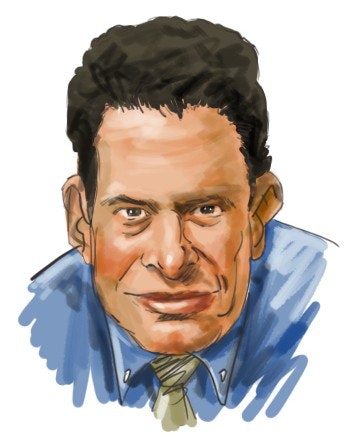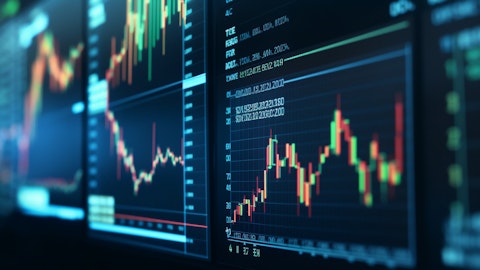Billionaire Ken Fisher, a prominent money manager, renowned author, and financial analyst, is the founder of Fisher Asset Management. Fisher founded his hedge firm in 1979 and was CEO until 2016 when he stepped down. Currently, he serves as Fisher Investments’ Executive Chairman and co-chief investment officer alongside Jeff Silk. The billionaire’s net worth is believed to be more than $11.2 billion, making him one of the wealthiest Americans and billionaires in the world. Known for his emphasis on long-term investment, Fisher also believes in diversification to reduce risk. To that end, Fisher Asset Management holds a highly diversified portfolio worth around $244 billion, with technology equities accounting for 31.8% of its assets.
Fisher Asset Management’s investing strategy is based on Ken Fisher’s conviction in capitalism and free markets, where securities prices are determined by supply and demand. The firm uses market research and key criteria such as the price-to-sales ratio to identify undervalued growth stocks. It asserts that securities prices are solely determined by supply and demand, and that capital markets accurately represent generally known facts.
Fisher’s 2025 Outlook
Fisher recently highlighted three potential trajectories for global equities in 2025, emphasizing that some factors—such as central bank rate reduction, GDP reporting, profitability, climate change, and Big Tech antitrust cases—will not influence their estimates. According to the billionaire, central banks’ activities follow market developments instead of driving them. Similarly, long-term issues such as peak oil consumption, demographic upheavals, and regulatory conflicts have little effect on stock prices in the near term. In addition, he believes that current political developments may affect emotion but not long-term market direction. Instead, bull markets collapse owing to either blind enthusiasm or an unanticipated economic shock with a global effect.
Speaking on President Trump’s tariffs specifically, Ken Fisher believes that the global economy and stock market will stay robust despite worries, stating:
“Market volatility can feel unsettling. However, selling stocks during a downturn can lead to missing out on gains if the market rebounds, which we believe will happen this year. While so far, President Trump has proposed larger tariffs this year than in 2018 to 2019, they may not be fully implemented or remain in effect as long as expected. Even if they do, businesses are also highly adaptable and find ways to adjust to shifting economic policies which can mitigate the longer term damage some fear. All in all, we still see a strong case for global economic growth ahead, despite tariffs, which should continue to support this bull market.”

Our Methodology
For this article, we picked companies from Fisher Asset Management’s 13F portfolio as of the end of the fourth quarter of 2024. The following firms have low beta values (<1), consistent dividend histories, and robust businesses. Additionally, we have mentioned the hedge fund sentiment around each stock, as of Q4 2024.
Why are we interested in the stocks that hedge funds pile into? The reason is simple: our research has shown that we can outperform the market by imitating the top stock picks of the best hedge funds. Our quarterly newsletter’s strategy selects 14 small-cap and large-cap stocks every quarter and has returned 373.4% since May 2014, beating its benchmark by 218 percentage points (see more details here).
10. The Charles Schwab Corporation (NYSE:SCHW)
Beta Value: 0.91
Dividend Yield: 1.38%
Fisher Asset Management’s Q4 Stake: $1.51 billion
Number of Hedge Fund Holders: 91
The Charles Schwab Corporation (NYSE:SCHW) is a financial services corporation that provides commercial banking, asset management, and wealth management solutions in the United States and internationally.
In the fourth quarter of 2024, The Charles Schwab Corporation (NYSE:SCHW) reported net income of $1.8 billion and an EPS of $0.94. Revenue for the quarter climbed by 20% to $5.3 billion, driven by improved client engagement, increased margin utilization, and record inflows into Managed Investing Solutions.
On March 17, JMP Securities analysts reiterated their favorable outlook on The Charles Schwab Corporation (NYSE:SCHW), with a Market Outperform rating and a $94 price target. The analysts praised Charles Schwab’s outstanding February metrics, highlighting the significant growth in net new assets, which jumped by $48 billion. This was a massive 44% rise over the previous year, with an annualized net new asset growth rate of 5.7%. Additionally, The Charles Schwab Corporation (NYSE:SCHW) experienced a minor growth in client cash holdings, which increased by $4.7 billion in February, a 1% increase over January numbers.
9. Merck & Co., Inc. (NYSE:MRK)
Beta Value: 0.40
Dividend Yield: 3.48%
Fisher Asset Management’s Q4 Stake: $1.6 billion
Number of Hedge Fund Holders: 91
Merck & Co., Inc. (NYSE:MRK) is a well-known American multinational pharmaceutical firm that has a long history dating back to the founding of the Merck Group in Germany in 1668. Internationally recognized as Merck Sharp & Dohme (MSD), the company is a global provider of prescription medications, vaccines, biologic therapies, and animal health products. The firm boasts a robust portfolio, including Keytruda, the world’s best-selling cancer therapy medicine.
Merck & Co., Inc. (NYSE:MRK) reported solid financial results for Q4 2024, with revenue up 7% year-over-year to $15.6 billion. Merck’s strong market position has enabled the company to produce significant cash flow, confirming its focus on shareholder returns. Notably, Keytruda sales climbed by 18% over the previous year to $29.5 billion.
On February 12, Guggenheim maintained its Buy rating on Merck & Co., Inc. (NYSE:MRK), but reduced its price target to $115 from $122. The shift comes after Guggenheim sponsored a webinar with Merck’s management team to review the company’s fourth-quarter results and strategic goals. With a solid gross profit margin of 80.85% and a sales rise of 6.74%, they highlighted Gardasil and Keytruda, two of the most important pharmaceuticals in Merck’s portfolio, as well as potential opportunities that investors may be missing.
8. UnitedHealth Group Incorporated (NYSE:UNH)
Beta Value: 0.64
Dividend Yield: 1.63%
Fisher Asset Management’s Q4 Stake: $1.73 billion
Number of Hedge Fund Holders: 150
UnitedHealth Group Incorporated (NYSE:UNH), based in Minnetonka, Minnesota, is a renowned US multinational corporation that provides managed healthcare and insurance services. The company operates through four main segments: UnitedHealthcare, Optum Health, Optum Insight, and Optum Rx. The company returned more than $16 billion to stakeholders through dividends and share repurchases.
The company reported solid fiscal year 2024 earnings that exceeded investor expectations. Revenue increased by 8% to $400 billion, driven by broad-based expansion across its service offerings. Throughout 2024, the UnitedHealth Group Incorporated (NYSE:UNH) returned more than $16 billion to shareholders via dividends and stock buybacks.
Following developments in a long-running Department of Justice (DOJ) case, Deutsche Bank analysts maintained their Buy rating on UnitedHealth Group Incorporated (NYSE:UNH) shares, with a price target of $591. The healthcare behemoth is allegedly close to a dismissal of the case, which accuses it of overbilling Medicare by at least $2.1 billion. With yearly sales over $400 billion and solid cash flows, UnitedHealth Group has shown tenacity throughout this court battle.
Vulcan Value Partners stated the following regarding UnitedHealth Group Incorporated (NYSE:UNH) in its Q4 2024 investor letter:
“UnitedHealth Group Incorporated (NYSE:UNH), a company that we have owned several times in the past, is the largest health insurer in the United States. UnitedHealth Group also owns Optum, which is a rapidly growing healthcare services company. The environment for the health insurance business remains positive as growth in healthcare spending, driven by chronic diseases and an aging population, will continue to outpace overall economic growth. The insurance business benefits from powerful network effects as more members attract more providers and vice versa, which reinforces United’s value proposition and bargaining power with each side of the network. We respect UnitedHealth Group’s management team and have been very pleased with their long-term vision and execution.”
7. Costco Wholesale Corporation (NASDAQ:COST)
Beta Value: 0.97
Dividend Yield: 0.51%
Fisher Asset Management’s Q4 Stake: $2.82 billion
Number of Hedge Fund Holders: 96
Costco Wholesale Corporation (NASDAQ:COST) is a membership-based warehouse club that offers bulk prices on a wide range of products including food, electronics, and household supplies. The devotion of its members fuels the company’s development, with membership fees accounting for a significant portion of its income. Costco Wholesale Corporation (NASDAQ:COST) reported that non-foods were up in the low teens in February, with jewelry, gift cards, and housewares outperforming other departments.
On March 13, DA Davidson reaffirmed its Neutral rating on Costco Wholesale Corporation (NASDAQ:COST) shares, with a price target of $1,000. The firm’s analyst, Michael Baker, attended the grand opening of Costco’s 900th club in Sharon, Massachusetts, the state’s first new Costco store in 23 years. Costco CEO Ron Vachris stated that the corporation is looking into future expansion in the region, with plans to establish up to four more clubs. This development plan is consistent with the company’s impressive sales growth, which reached $264 billion in the last 12 months and has maintained a respectable 11% compound annual growth rate over the last five years.
Aoris Investment Management stated the following regarding Costco Wholesale Corporation (NASDAQ:COST) in its Q4 2024 investor letter:
“Firstly, I think we exercised good valuation discipline in our sales of Costco Wholesale Corporation (NASDAQ:COST) and Cintas. The share prices of these two companies had increased by more than 60% and 40% respectively in the year prior to our sale. It can be difficult as investors to remain objective and not ‘fall in love’ with an investment when it is performing well. A higher share price doesn’t make a business more valuable!
We sold both Costco and Cintas simply for reasons of valuation. These are exceptional businesses that we’d love to own again if valuation permits. Their sales allowed us to recycle portfolio capital into more attractively valued businesses.”
6. Chevron Corporation (NYSE:CVX)
Beta Value: 0.93
Dividend Yield: 4.15%
Fisher Asset Management’s Q4 Stake: $2.88 billion
Number of Hedge Fund Holders: 81
Chevron Corporation (NYSE:CVX) is a renowned American global energy company that focuses on the oil and gas industry. It was founded as the Standard Oil Company of California and is the second-largest direct descendant of Standard Oil. The company operates in over 180 countries throughout the world.
On March 7, Goldman Sachs analyst Balaji Krishnamurthy reaffirmed Chevron Corporation’s (NYSE:CVX) Buy rating and set a price target of $183 on the company’s shares. One of the primary reasons for the rating is the anticipated rise in production and free cash flow, notably from critical projects like Tengiz in Kazakhstan, the Permian Basin, and the Gulf of America. These projects are expected to dramatically increase Chevron’s production capacity and generate an additional $10 billion in free cash flow by 2026. Furthermore, Chevron’s commitment to shareholder returns is critical. The firm expects to achieve a capital returns yield of around 12% by 2026.
Chevron Corporation (NYSE:CVX) reported a solid performance in Q4 2024, raking in $3.2 billion, up from $2.3 billion in 2023. Full-year 2024 production also hit new highs, with a 7% increase in global output and a significant 19% increase in US production, owing mostly to the company’s growth in the Permian Basin. This achievement allowed the company to repay a record $27 billion to shareholders via dividends and buybacks.
5. Visa Inc. (NYSE:V)
Beta Value: 0.96
Dividend Yield: 0.70%
Fisher Asset Management’s Q4 Stake: $3.08 billion
Number of Hedge Fund Holders: 181
Visa Inc. (NYSE:V) is an American multinational payment card service provider that offers a wide range of related services and products to its clients. The company connects about 4 billion account holders to more than 130 million businesses and 14,500 financial institutions in over 200 countries.
Visa Inc. (NYSE:V) reported strong fiscal first-quarter 2025 results, boosted by strong Christmas spending and better payment volume trends. Revenue also grew 10% to $9.5 billion, while net income increased 11% to $5.5 billion.
On February 24, TD Cowen analyst Bryan Bergin revised Visa Inc.’s (NYSE:V) financial forecast, raising the price target to $382 from $363 and retaining a Buy rating on the company’s stock. Bergin’s evaluation came after Visa’s Investor Day, which provided insights into the company’s strategies and financial model. Notably, Bergin appreciated the extra information on Visa’s Value Added Services (VAS) and New Flows, which he saw as a positive element for possible multiple expansion.
Baron FinTech Fund stated the following regarding Visa Inc. (NYSE:V) in its Q4 2024 investor letter:
“Favorable stock selection in Payments was mostly attributable to double-digit gains from global payment companies Visa Inc. (NYSE:V) and Fiserv, Inc. Visa was a top contributor after the company reported strong quarterly results and provided a positive outlook for the next fiscal year. Quarterly revenue growth of 12% and EPS growth of 16% exceeded Street expectations, and initial guidance for fiscal 2025 calls for continued double-digit earnings growth.”
4. The Procter & Gamble Company (NYSE:PG)
Beta Value: 0.43
Dividend Yield: 2.42%
Fisher Asset Management’s Q4 Stake: $3.13 billion
Number of Hedge Fund Holders: 79
The Procter & Gamble Company (NYSE:PG) ranks as one of the world’s leading consumer goods companies that serves consumers through a portfolio of over 80 renowned brands, including Gillette and Oral-B.
The Procter & Gamble Company (NYSE:PG) reported fiscal Q2 2025 revenues of $21.9 billion, a 2% year-over-year growth that outperformed analysts’ forecasts by more than $291 million. Moreover, the company’s organic sales increased by 3%. Despite pausing price hikes, the firm achieved volume growth, which is critical for long-term revenue stability.
On March 17, Erste Group analysts upgraded Procter & Gamble (NYSE:PG) shares from Hold to Buy. The upgrade comes as analysts emphasize the company’s strong operating margin, which exceeds that of its competitors, as well as predicted sales growth in 2025 and 2026. They believe that Procter & Gamble’s foreign sector will grow faster than its US revenues.
3. Exxon Mobil Corporation (NYSE:XOM)
Beta Value: 0.60
Dividend Yield: 3.43%
Fisher Asset Management’s Q4 Stake: $3.2 billion
Number of Hedge Fund Holders: 104
Exxon Mobil Corporation (NYSE:XOM) is an energy company that produces, trades, transports, and sells crude oil, natural gas, petroleum products, petrochemicals, and specialty commodities. The firm is also dealing with low-emission technology.
On February 4, Goldman Sachs analyst Neil Mehta reduced the price target for XOM stock from $123 to $117 while maintaining a neutral rating on the shares. The stock update comes after Exxon Mobil released its fourth-quarter financial results. According to Mehta, the key reason for the decreased price target is the stock’s value assumptions and a weaker earnings projection. Goldman Sachs now predicts that Exxon Mobil will earn $7.49 per share in 2025 and $9.41 in 2026, down from $8.17 and $9.97 before. That being said, Exxon Mobil Corporation (NYSE:XOM) plans to launch several large projects in the upcoming years, with the objective of producing more than $3 billion in earnings by 2026.
In the fourth quarter of 2024, the company set a production record with Heritage ExxonMobil and Pioneer assets in the Permian Basin, with output forecast to rise from 1.5 million oil-equivalent barrels per day at the end of 2024 to 2.3 million barrels per day by 2030.
2. Eli Lilly and Company (NYSE:LLY)
Beta Value: 0.49
Dividend Yield: 0.72%
Fisher Asset Management’s Q4 Stake: $4.04 billion
Number of Hedge Fund Holders: 115
Eli Lilly & Company (NYSE:LLY) is a major global pharmaceutical company that develops, manufactures, and distributes a wide range of drugs. Founded in 1876, it has grown to become one of the world’s largest pharmaceutical companies.
Bernstein SocGen Group maintained a favorable view for Eli Lilly & Company (NYSE:LLY) shares on March 18, confirming an Outperform rating and a $1,100 price target. The update follows recent pre-clinical data published on March 14th, which shows Eli Lilly’s Retatrutide having great potential for lowering tumor development and cancer risk, especially in lung and pancreatic cancer models in mice. Bernstein analyst Courtney Breen stressed the significance of this study, noting its possible implications for the variety of health outcomes possible with incretin-based anti-obesity drugs.
In the fourth quarter of 2024, the company’s revenues jumped by 45% to $13.53 billion, owing to increasing demand for Mounjaro and Zepbound. while earnings per share rose massively by 102% to $4.88.
1. Walmart Inc. (NYSE:WMT)
Beta Value: 0.70
Dividend Yield: 1.09%
Fisher Asset Management’s Q4 Stake: $4.4 billion
Number of Hedge Fund Holders: 116
Walmart Inc. (NYSE:WMT) ranks as the largest brick-and-mortar retailer in the world, with over 100,000 stores. The company’s business sectors include Walmart US, Walmart International, and Sam’s Club, offering offer a range of goods like fashion, electronics, and household goods.
Walmart Inc.’s (NYSE:WMT) net income for the three months ended January 31 was $5.25 billion, down from $5.49 billion the previous year. Revenue, however, increased from $173.39 billion in the same quarter the previous year. Furthermore, Walmart’s e-commerce sales in the United States increased 20% from the previous year, marking the 11th consecutive quarter of double-digit growth.
On February 21, UBS analyst Michael Lasser lowered the price target for Walmart Inc. (NYSE:WMT) to $112 from $113 while maintaining a Buy rating. Lasser’s study suggests that Walmart will continue to perform well, with a 69.9% return over the last year and a 29.5% increase in the last six months. While comparable sales and eCommerce growth slowed somewhat in the fourth quarter, he highlighted that this is not a sign of a substantial slowdown in the future. Moreover, despite decreased sales, the company’s performance exceeded the midpoint of its profits per share projection by nearly 11%.
While we acknowledge the potential of WMT as an investment, our conviction lies in the belief that certain AI stocks hold greater promise for delivering higher returns, and doing so within a shorter time frame. If you are looking for an AI stock that is more promising than WMT but trades at less than 5 times its earnings, check out our report about the cheapest AI stock.
READ NEXT: 20 Best AI Stocks to Buy Now and 30 Best Stocks to Buy Now According to Billionaires.
Disclosure: None. Insider Monkey focuses on uncovering the best investment ideas of hedge funds and insiders. Please subscribe to our free daily e-newsletter to get the latest investment ideas from hedge funds’ investor letters by entering your email address below.





